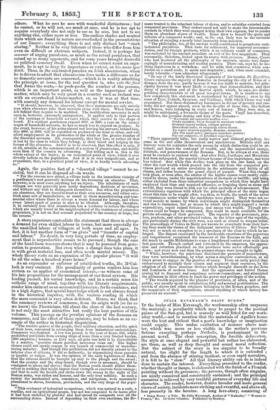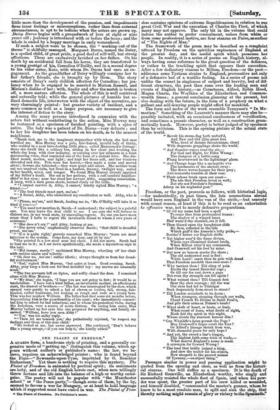JULIA KAVANAGH'S DAISY Bl7RNS. 8 IN the books of Miss Kavanagh,
the workmanship often surpasses the material; a peculiarity which may be proper to the poetical palace of the Sun-god, but is scarcely so well fitted for our work- aday world,—not to mention that the materials of Apollo's house were the best and richest that a poet's knowledge or imagination could supply. This undue exaltation of manner above mat- ter, which was more or less visible in the writer's previous fictions excepting perhaps Nathalie, is predominant in the present novel. The clear conception, the forcible delineation, the style at once elegant and powerful but rather too elaborated, are there, as well as deep thought and sound moral reflection. But the subject of the story is too singular to be broadly natural, too slight for the length to which it is extended ; and from the absence of stirring incident, or even rapid narrative, it is felt to be "slow." All that literary ability can do is indeed done to sustain the interest. Everything presented to the reader, whether thought or image, is elaborated with the finish of a Flemish painting without its grossness ; the persons, though often singular, are nicely conceived and consistently sustained; and the principal narrative is relieved by very truthful pictures of everyday life and character. The reader, however, desires broader and more general views of society, incidents more striking and eventful, and above all, less precocity in the heroine. A long love-story, consisting of • Daisy Burns : a Tale. By Julia Kavanagh, Author of "Nathalie," "Woman in France," &c. In three volumes. Published by Bentley.
little more than the development of the passion, and impediments from inner feelings or misconoeptione rather than from external '
circumstances is apt to be tedious when the actors are grown up. Daisy Burns begins with a groundwork of love at eight or nine years old ; jealousy is introduced with or before the teens.; and the whole is ,rna.a by a.happy marriage in early womanhood.. If such a subject were to be chosen, the " working out of the theme " is skilfully managed. Margaret Burns, named the Daisy, is a spoiled child, of great pride, a good deal:of self-will, but strong affections. These are exclusively lavished an her father. On his death by an.accidental fall from his horse, they are transferred to a. young prate* of his, Cornelius O'Reill;-, and in. a. second degree to his elder sister,. ICate, with whom Dr. Darns had once an en- gagement. As the grandfather of Daisy-willingly consigns her to her- father's friends she is brought up by them. The story consists of Daisy's early chirdish affection for Cornelius • her jea- lousy when he is engaged to be married to Miriam Rarisell, and dislike of her ; with,. finally and after the match is broken off, a more mature affection. The whole of this is well contrived and naturally told; while the general pictures of humble but re- fined domestic life,interwoven. with. the object. of the narrativerare very charmingly painted: but greater variety of incident,. and a ,more common as well as a larger purpose, are necessary to give the interest of fiction to the story. Among the many persons introduced in connexion with the actors but without contributing. to the action, Miss Murray may be instanced as a specimen of finished painting; with a spice of satire. The lady was a patient of Dr. Burns—very delicate ; and to her his daughter has been taken on his death, as to the nearest neighbour.
'Farah took me to the imaginary- stepmother -with whom she had once terrified me. Miss Murray was a pale, fair-haired, invalid lady of thirty, who resided in a neat hire-looking little place, called' Honeysuckle Cottage : there she dwelt like a solitary bee, sitting in her chair and working the whole day long; with slew industry, or conning over her ailments in a faint murmuring voice, that reminded one of the hum of a distant hive. She dis- liked sound; motion, and light ; and kept her floors soft, and her windows shrouded' and dim. Pets were her horror,—they made a noise and moved about; flowers she tolerated;—they were quiet and silent. She neither went out nor received visits, but lived in, a hushed; dreamy, twilight way, suited to her health, mind, and temper. We found Miss Murray already apprized ofmy firther's.death. She satin her parlour, with a soft cambric handker- ehief to her eyes ; near her stood her servant Abby, suggesting consolation. A ham_p; with a dark green shade, burned dimly on the table. cannot survive it, Abby, I cannot,' faintly sighed Miss Murray; a Mena= "''The best friends must part, ma'am.' c". ..k friend, Abby, who understood my constitution so well. Abby, who is that? "
" 'Please, ma'am,' said Sarah, leading, me in, Mr-011.13filYw8 take it so kind if you—' " 'You need notmention it, Sarah—I understand-, the subject is a painful one. You may leave the dear child to me. I am sure she will forbear to distress me in my-weak state, byunavailingregrets. No one can have more cause than r have to regret the invaluable friend to whomi owe years of existence.'
"'She doesn't .eryl." said Abby; looking atme. "`She never cnes,' emphatir.liy observed' Sarah; 'that-child-is dreadful Pad; ma'am:
prau ,
ELe is quite righ4-' gravely remarked Miss Murray; 'tears- are most injurious to the-system. Come here, my dear, and sit hy ma' "She pointed to a low stool near- her chair. I did not move. Sarah had to me to it ; asI sat down apathetically, she made a mysterious sign to the lady.
"'Not insane, surely ! exclaimed Miss Murray; wheeling of her chair with surlden.alaim and velocity.
"-Oh dear no, ma'am ! ratheridiotic; always thoughtsofrom her dread- ful stubbornness.'
" Sad,' sighed Miss Murray, 'but quiet at least. Good evening, Sarah. Abby, pray keep a look-out forthat-dreadful boy : my nerves are unusually weak.
"-The two servants left on tiptoe, and softly closed the door. I remained alone with Miss Murray.
"'My dear,' she began, 'I hope you are not going.to fret; it would be so 'unchristian. I have lost a kind father, an invaluable mother, an affectionate aunt, the dearest of brothers—' The list was interrupted by the-door, which opened very-gently to admit a lad of eleven or twelve tall, strong, fair- headed, rather handsome, but looking as rough and rude as a young bear. This was her nephew William. His father had died some six months before, bequeathing himte the guardianship of his aunt; who immediately commit- tedium. to school for bad behaviour, and to whom his periodical visite, during the holydays, were a source of acute distress. On seeing him enter, Miss Murray turned up her eyes like one prepared. for-anything, and faintly ob- served,' have you seen Abby? "'Yes,' was his sulky reply- " Then let me beseech you,' she pathetically rejoined, 'to respect my feelings and those of this dear child ' "He looked at me, but never answered. She continued, ' Don't behave Eke a young savage,—if you can help it,' she kindly added.""



























 Previous page
Previous page